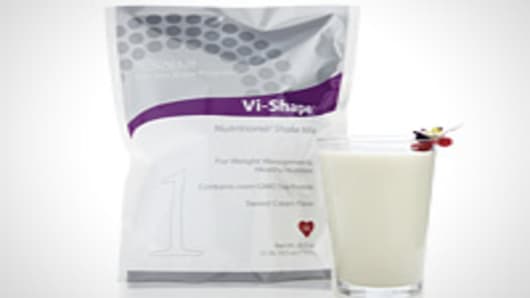When it comes to initial public offerings, the only thing worse than a seemingly get-rich-quick deal is a seemingly get-rich-quick deal involving what appears to be a business that promotes a way to get-rich (quick or otherwise).
Enter FVA Ventures, better known as ViSalus, which like its rival, Herbalife , is a multi-level marketer of weight-loss shakes and nutritional supplements that also offers the dream of striking it rich. (Related Link: The SEC's Back and Forth With Herbalife.)
The difference is that ViSalus, which is being spun off of publicly traded candle marketer Blyth, has turned in explosive growth over the past year with a story that on the surface looks, well, almost too good to be true (which almost always is a big red flag). (Related Link: Blyth Retruns to Profit in 2Q.)
Consider that:
- Sales in the first six months of the year up an astonishing 450 percent to $326 million.
- Customer count in the same period up 500 percent to 1.2 million.
- Distributor count (they call them, aptly enough, “promoters”) jumped 300 percent to 114,000.
- Gross margin: 71 percent.
Impressive until you dig deeper into the company’s IPO filing and other resources.
Among the notable concerns:
Like any multi-level marketer, ViSalus walks what appears to me, based on the my read of the comany’s filing, to be a controversial line between legal direct selling and pyramid scheme. In a lengthy risk disclosure in its prospectus about the risks associated with regulatory oversight by the Federal Trade Commission, ViSalus says that “we do not believe that we are subject to laws regulating pyramid schemes,” but warns that “there is a risk that a governmental agency or court could disagree with our assessment...”
It seems from reading the company’s prospectus that the guts of the company’s business model is distributor recruitment. In its simplest form, ViSalus is in the business of selling product to distributors. The distributors, in turn, “earn commissions based on sales of the product,” the company says. But it adds that purchases “include those made by customers our individual promoters have enrolled, as well as purchases of our products by individual promoters in their down-line sales organizations and customers enrolled by such individual promoters.”
As with any multi-level marketer, ViSalus appears to have a hard time hanging onto distributors. The company doesn't disclose its distributor failure or turnover rate, but it does acknowledge in its prospectus that its “marketing system depends upon the successful recruitment, retention and motivation of a large number of individual promoters to offset frequent turnover.” (Emphasis mine.)
To lure distributors, ViSalus touts on its website “the path to prosperity,” while independent distributor sites directly promote “financial freedom.” The ultimate goal, according to ViSalus’s website, is to become a “crown ambassador,” which leads to a “a cool $1,000,000 bonus check.”
Along the way, the company says, a distributor who becomes a “regional director” becomes eligible for the “Bimmer Club,” which means ViSalus will pay a monthly BMW lease. “Over 10,000 people have already qualified for a ViSalus BMW!” the company’s website says. “Somebody new qualifies every 40 minutes!”
(Fine print: Don’t earn enough commissions in any month and “ViSalus reserves the right to recover your BMW Bonus for that month.”)
The payouts are real. For the first six months commissions equaled 48 percent of sales compared with 38 percent for Herbalife. However, with a relatively short track record raised an obvious question for investors: Is such a high payout rate, which has been a draw to distributors, sustainable?
—By CNBC's Herb Greenberg
Questions? Comments? Write to HerbOnTheStreet@cnbc.com
Follow Herb on Twitter: @herbgreenberg
Find Herb on Google+
Subscribe to Herb athttp://www.facebook.com/herb.greenberg
Catch all of Herb's Articles Here



